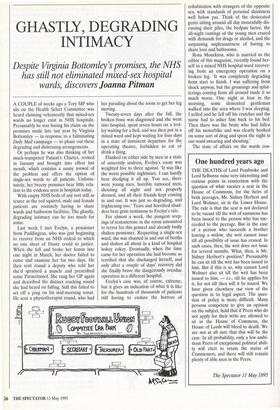GHASTLY, DEGRADING INTIMACY
Despite Virginia Bottomley's promises, the NHS has still not eliminated mixed-sex hospital wards, discovers Joanna Pitman
A COUPLE of weeks ago a Tory MP who sits on the Health Select Committee was heard claiming vehemently that mixed-sex wards no longer exist in NHS hospitals. Presumably he was basing his claim on the promises made late last year by Virginia Bottomley — in response to a fulminating Daily Mail campaign — to phase out these degrading and distressing arrangements.
Or perhaps he was also thinking of her much-trumpeted Patient's Charter, revised in January and brought into effect last month, which contains a sunny avowal of the problem and offers the option of single-sex wards to all patients.. Unfortu- nately, her breezy promises bear little rela- tion to the evidence seen in hospitals today.
With empty NHS beds of any sort still as scarce as the red squirrel, male and female patients are routinely having to share wards and bathroom facilities. The ghastly, degrading intimacy can be too much for some.
Last week I met Evelyn, a pensioner from Paddington, who was just beginning to recover from an NHS ordeal to which no one short of Dante could to justice. When she fell and broke her femur late one night in March, her doctor failed to come and examine her for two days. He then sent round a deputy who told her she'd sprained a muscle and prescribed some Paracetamol. She rang her GP again and described the distinct cracking sound she had heard on falling. Still this failed to set off a ping on his mid-morning sonar. He sent a physiotherapist round, who had her parading about the room to get her leg moving.
Twenty-seven days after the fall, the broken bone was diagnosed and she went into hospital, spent seven hours on a trol- ley waiting for a bed, and was then put in a mixed ward and kept waiting for four days in a state of imminent departure for the operating theatre, forbidden to eat or drink a thing.
Flanked on either side by men in a state of unseemly undress, Evelyn's room was weighted five to three against. 'It was like the worst possible nightmare. I can hardly bear dredging it all up. You see, there were young men, horrible tattooed men, shouting all night and not properly dressed, and all their friends kept coming in and out. It was just so degrading, and frightening too.' Tears and horrified shud- ders bear grim testimony to Evelyn's tale.
For almost a week, the pungent seep- ings of testosterone in the room amounted to terror for this genteel and already badly shaken pensioner. Requesting a single-sex ward, she was shunted in and out of berths and shaken all about in a kind of hospital hokey cokey. Eventually, when the time came for her operation she had become so terrified that she discharged herself, and only after a couple of days' recovery did she finally brave the dangerously overdue operation in a different hospital.
Evelyn's case was, of course, extreme, but it gives an indication of what it is like for the hundreds of thousands of patients still having to endure the horrors of cohabitation with strangers of the opposite sex, with standards of personal daintiness well below par. Think of the desiccated gents sitting around all day mournfully dis- cussing their piles, the bedpan factor, the all-night rantings of the young men crazed with demands for drugs or alcohol, and the surpassing unpleasantness of having to share loos and bathrooms.
Rosa Monckton, who is married to the editor of this magazine, recently found her- self in a mixed NHS hospital ward recover- ing from an emergency operation on a broken leg. 'It was completely degrading from start to finish. I was suffering from shock anyway, but the groanings and splut- terings coming from all around made it so much worse. One night at four in the morning, some demented gentleman walked into the area where I was sleeping. I yelled and he fell off his crutches and the nurse had to usher him back to his bed. Then there was the brute who had fallen off his motorbike and was clearly hooked on some sort of drug and spent the night in our ward swearing and shouting.'
The state of affairs on the wards con-
trasts ironically with the suave assurances contained in the revised Patient's Charter. This cosily illustrated, feel-good pamphlet states: 'Except in emergencies, you have the right to be told before you go into hos- pital whether it is planned to care for you in a ward for men and women . . . you can expect single-sex washing and toilet facili- ties. If you would prefer single-sex accom- modation . . . your wishes will be respected wherever possible.'
Unfortunately, those firmly emboldened words 'right' and 'expect' do not go far in distracting from the magnificent ambiguity of phrasing and the almost narcotic general- ity of objectives of what seems to be an `operation salvage reputation' charter. More unfortunate is the fact that the words 'wher- ever possible' pedantically, irritatingly and grindingly mean exactly what they say.
At St Thomas's Hospital it is Bill Addi- son, the bed manager, who daily shuffles uneasily round the word 'wherever' and frequently ends up replacing it with 'not'.
Ninety per cent of the wards at St Thomas's are mixed, but with the sexes theoretically segregated in 'bays' (small enclosed rooms for six or eight beds, a bit like railway compartments within a car- riage). 'The bays are as far as possible kept single-sex, but inevitably some end up mixed because sometimes the number of patients coming in means there is no alter- native.' The rest of the beds are fully mixed in the specialist high-technology and acute emergency wards, where good neighbourliness is a low priority, and also in the Nightingale wards, the old open- plan mixed wards where men and women lie as little as three feet apart.
Reality on many of these wards, accord- ing to the Greater London Association of Community Health Care (GLACHC), is near purgatory. GLACHC's report on the policies, practices and preferences on mixed-sex hospital wards, published in March, found that 'mixing men and women together has become normal prac- tice, in spite of the fact that numerous sur- veys carried out on the issue show that people overwhelmingly disagree with the practice . . . No guarantee of a single-sex facility can be given unless hospitals make major changes to their layout and bed allocation policies.'
GLACHC's surveys offer graphic illus- trations of the loss of privacy and dignity in mixed bays and open-plan mixed wards. As one man related, 'The woman next to me could not get out of bed and, being a heavy woman, had to be heaved onto the bedpan. The drawn curtains gave her no privacy and the sound of her draining bladder was akin to catching Niagara in a saucepan . . . I was grateful that I could manage my fumblings with a bottle and that these were, to some extent, hidden by a sheet.'
There are some, however, who positively prefer a mixed ward. They tend to be men. One told me that he found the company of women far more sympathetic and caring than that of men, and that the presence of women meant the general level of self-dis- cipline and self-respect improved. 'The men made a bit of an effort to shave and dress properly. Also, with women on the ward, I was more likely to get a second helping at mealtimes.' The snoring factor also favoured a dilution of men and women, he said.
For the chronically ill, however, the question of wanting a single-sex ward is a bit like two blind people fighting for a mir- ror. Professor Roger Williams, chairman of the Conservative Medical Society and con- sultant hepatologist at King's College Hos- pital, favours single-sex wards in principle but opposes segregation in specialist high- technology treatment wards. 'We've always had mixed wards in my area of liver disease and it's worked very well because these people have acute problems and simply want the highest level of treatment.'
Most of the doctors and nurses I talked to were heartily sceptical of the Patient's Charter and concerned that Mrs Bottomley might go vote-wooing by offering total seg- regation of the sexes, impossible without loads more money, they say. But they all reserved a few words of special fury for the Conservative MPs who claim that mixed wards are extinct.



































































 Previous page
Previous page